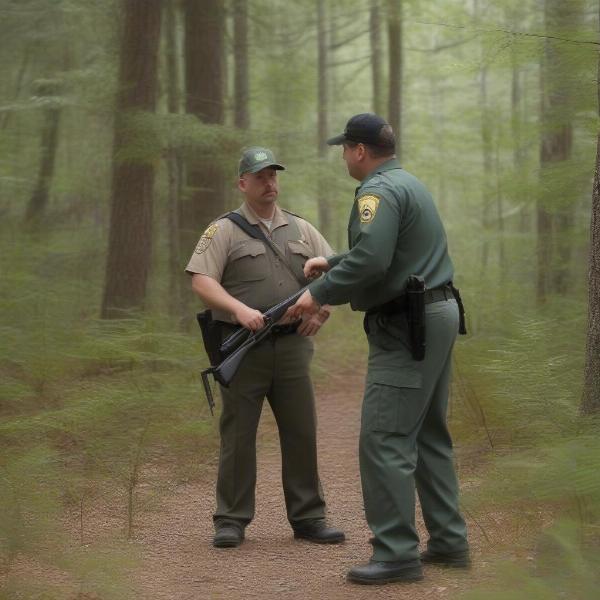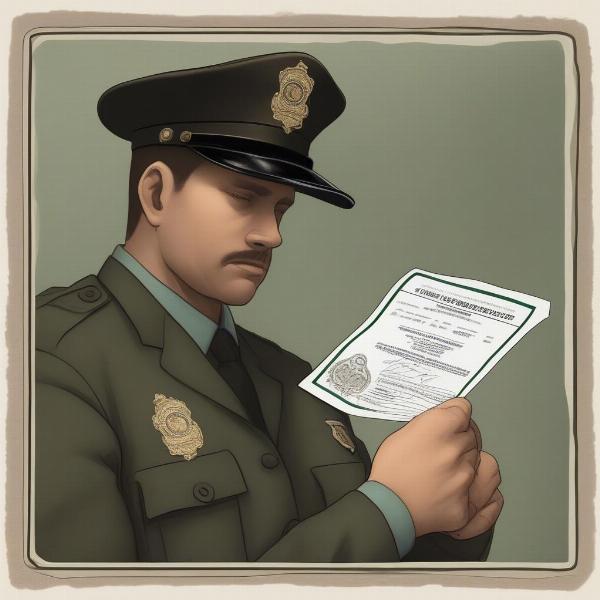At SupremeDuelist.blog, we delve into the nuances of outdoor regulations and law enforcement. One common question arises: Can Game Wardens Arrest You? The answer isn’t a simple yes or no, as their authority is more complex than many might realize. This article aims to explore the powers of game wardens, the limits of their jurisdiction, and the scenarios where an arrest might occur.
Game wardens, also known as conservation officers or wildlife officers, are law enforcement officials tasked with protecting natural resources and enforcing wildlife laws. Their role extends beyond just hunting and fishing violations; it also includes environmental protection and public safety in outdoor settings. It’s crucial to understand their authority to ensure you’re complying with the law and avoiding any legal complications.
The Scope of a Game Warden’s Arrest Powers
Game wardens are primarily responsible for enforcing state and federal laws related to wildlife, fisheries, and environmental conservation. This means they have the power to investigate suspected violations, issue citations, and yes, in certain circumstances, make arrests. Their jurisdiction typically covers state parks, wildlife management areas, and any other areas where these natural resources are located.
Their arrest powers are not limitless; they are generally confined to offenses related to their specific jurisdiction. For example, a game warden might arrest someone for poaching, hunting without a license, or possessing illegal wildlife. However, they are not typically empowered to make arrests for general criminal offenses unrelated to their duties. The powers of a game warden are similar to those of other law enforcement officers. For example, you might also wonder can game warden pull you over while you’re in a vehicle within their jurisdiction.
What Specific Violations Can Lead to Arrest?
Several specific violations can lead to an arrest by a game warden, including:
- Poaching: Illegally hunting or taking game animals, often out of season or without the proper permits.
- Hunting or Fishing Without a License: Engaging in these activities without the required permits or licenses.
- Trespassing: Hunting or fishing on private property without the owner’s permission.
- Environmental Violations: Polluting or damaging natural resources.
- Possession of Illegal Wildlife: Keeping or transporting animals that are protected or banned.
- Refusal to Cooperate: Hindering a game warden’s investigation or refusing to provide identification.
 Game Warden Arresting a Poacher
Game Warden Arresting a Poacher
The Process of an Arrest by a Game Warden
If a game warden suspects that you have committed a violation, they have the authority to approach you, ask questions, and inspect your hunting or fishing equipment. This includes checking for valid licenses, inspecting harvested animals, and ensuring compliance with regulations. If, based on their investigation, they find probable cause that you have committed a crime, they can make an arrest.
Following an arrest, the game warden will typically take you into custody, inform you of your rights (similar to a Miranda warning), and transport you to the appropriate booking facility. You will then be processed and may have to appear in court to face the charges against you. It’s important to note that if you’re not following the rules, game wardens can enforce the law, just as other officers do in their areas.
Do Game Wardens Need a Warrant to Make an Arrest?
Generally, game wardens don’t need an arrest warrant if they have probable cause to believe that a crime has been committed within their jurisdiction. Probable cause means they have a reasonable belief that a violation has occurred, often based on direct observation or evidence collected during an investigation. However, for some types of searches or arrests, they may need a warrant, especially if it involves private property not under immediate surveillance. The legal processes for arrest are fairly standard, regardless of which agency makes the arrest.
What Rights Do You Have When Arrested by a Game Warden?
Even when arrested by a game warden, you still have legal rights that must be respected. These rights include:
- The right to remain silent: You do not have to answer questions beyond providing identification.
- The right to an attorney: You can request legal counsel during questioning and throughout the legal process.
- The right to be informed of the charges against you: You must know what crime you are being accused of.
- The right to a fair trial: You have the right to a hearing where your case is judged impartially.
It’s crucial to be aware of these rights and to exercise them if needed, while always maintaining a respectful demeanor towards law enforcement officers.
Game Wardens and Interactions With the Public
Beyond arrests, game wardens perform various other functions that can affect the public. They often participate in educational outreach, teaching people about wildlife conservation and safe outdoor practices. They can also assist in search and rescue operations, especially in remote or difficult terrain. As a result, they are a familiar face to people who enjoy outdoor activities.
Common Misconceptions About Game Wardens
There are many misconceptions about the role of game wardens. Some common myths include:
- Game wardens are only concerned with hunting and fishing: They have a much broader role, including environmental protection and public safety.
- Game wardens have no authority over private land: They can often enter private land if there is reasonable suspicion of a violation.
- Game wardens are not real law enforcement: They are sworn officers with the same legal authority to enforce laws.
- Game wardens have absolute power: They must still adhere to legal procedures and respect individual rights.
“Game wardens play a critical role in protecting our natural resources, but it’s equally important to know your rights,” says Marcus Thorne, a former wildlife law enforcement officer. “Understanding the law and cooperating with authorities is the best way to avoid issues in the field.”
How to Interact with a Game Warden
When you encounter a game warden, it’s essential to remain calm, respectful, and cooperative. If they ask questions, be honest and avoid making false statements, as this could be used against you. Present your licenses and permits, if requested, and cooperate with any inspections. Most importantly, know the rules and regulations governing your activities to ensure compliance.
What Happens After an Arrest?
Once you’ve been arrested by a game warden, the next steps usually involve booking, arraignment, and court proceedings. Booking typically includes taking your fingerprints and photos and documenting your personal information. During the arraignment, you’ll be formally charged, and you’ll enter a plea (guilty or not guilty).
If you plead not guilty, the case will move to a trial or hearing. If you are convicted, penalties can vary from fines to jail time, depending on the severity of the offense. It’s always advisable to seek legal counsel to navigate the legal process effectively.
Penalties for Violating Game Laws
The penalties for violating game laws can be quite severe. Depending on the specific violation and the jurisdiction, penalties can include:
- Fines: Ranging from hundreds to thousands of dollars, depending on the nature of the violation.
- Jail time: Especially for serious or repeat offenses, like poaching or illegal commercialization of wildlife.
- Loss of Hunting or Fishing Privileges: Suspension or revocation of your licenses.
- Confiscation of Equipment: Seizure of vehicles, guns, fishing gear, or other equipment involved in the violation.
- Restitution: Requiring you to pay for damages or loss to the natural resources.
 Game Warden Inspecting Hunting License
Game Warden Inspecting Hunting License
Preventative Measures
The best way to avoid legal trouble with game wardens is to understand and follow all the rules and regulations. Before you head into the outdoors, familiarize yourself with local hunting and fishing laws, licensing requirements, and other relevant regulations. Make sure you have all the necessary permits and licenses, and be respectful of private property boundaries. “Preparation and adherence to the regulations are your best defense,” advises Dr. Emily Carter, an environmental law expert. “When in doubt, always check with the relevant authorities.”
Conclusion
In summary, can game wardens arrest you? The answer is a definite yes, under specific circumstances and for violations related to their jurisdiction. Game wardens are not just there to check licenses; they are law enforcement officers responsible for protecting our natural resources. Understanding their authority, your rights, and the rules and regulations governing outdoor activities is crucial for any outdoor enthusiast. At SupremeDuelist.blog, we hope this article has given you a clear picture of this important area of law. Always prioritize compliance and stay informed for a safe and enjoyable experience in nature.
Leave a Reply